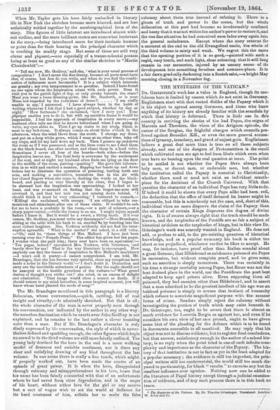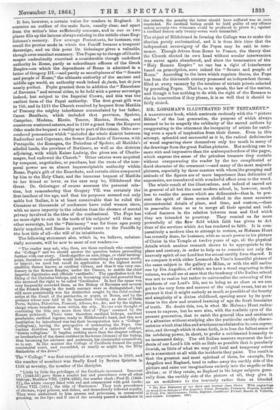THE MYSTERIES OF THE VATICAN.*
• The Mysteries of the Vatican. By Dr. Theodor Griesinger. Translated. London: W. Allen and Co. Da. GRIESINGEB'S work has a value in England, though its use- fulness here is limited by causes which do not exist in Germany. Englishmen start with that rooted dislike of the Papacy which it is his object to spread among Germans, and those who know anything of its history are already familiar with the scandals by which that history is deformed. There is little use in this country in reviving the stories of the bad Popes, the reigns of Marozia and Theodora, the vices of the Avignon episode, the career of the Borgias, the frightful charges which councils pre- ferred against Benedict XII., or even the more general accusa- tions of tyranny, treachery, and greed of unjust gain. Englishmen believe a great deal more than is true on all those subjects already, and one of the dangers of Protestantism is the recoil which cultivated men are apt to feel from libels which even when true have no bearing upon the real question at issue. The point to be settled is not whether the Popes 'Ave always been holy men, or decent men, or endurable men, but whether the institution called the Papacy is essential to Christianity, whether there need or need not exist an individual mouth- piece for the decisions of the Church Universal. With that question the character of an individual Pope has very little to do. If indeed it could be shown that every Pope alike had been evil, the deduction that the office of itself debased its bearer might be reasonable, but this is notoriously not the case, and, short of this, individual vices no more disprove the claim of' the Papacy than the character of certain Kings disproves the dogma of divine right. It is of course always right that the truth should be made known, and the turpitudes of the Pontiffs are as fair a subject of historical criticism as the turpitudes of kings, but in this view Dr. . Griesinger's work was scarcely wanted in England. He does not add, or profess to add, to the pre-existing quantum of historical knowledge, and as a popular summary his book is either too short or too prejudiced, whichever verdict lie likes to accept. He may, for instance, have proof other than Italian scandal about a great German, that Hildebrand as subdeacoa poisoned six Popes in succession, but without complete proof, and lie gives none, such an assertion is simply monstrous. There was certainly in his time a strange mortality among Popes, but Rome was not the best drained place in the world, nor the Pontificate the post best adapted to keep aged priests alive. Even supposing them all poisoned, they had enemies other than Hildebrand, and to assert that a man admitted to be the greatest intellect of his age was an habitual poisoner is simply to arouse that instinct of humanity which refuses to associate magnificent purpose with the meaner forms of crime. Readers simply reject the calumny without investigating the portion of truth which may exist beneath it. Dr. Griesinger, too, ought to be aware that there is almost as much evidence for Lucretia Borgia as against her, and even if he considers his own view of her case proved, ought to have given some hint of the pleading for the defence which is to be found in documents accessible to all mankind. He may reply that his object was not to discuss evidence, but to register final conclusions, but that answer, satisfactory enough in the author of a school his- tory, is no reply when the point tried is one of such infinite com- plexity and importance as the character of the Papacy. The his- tory of that institution is not in fact as yet in the least adapted for a popular summary ; the evidence is still too imperfect, the prin- cipal writers still too controversial, the world still too much dis- posed to partizanship, for blank " results" to exercise any but the smallest influence over opinion. Nothing now can be added to the literature of Papal history except through a judicial examina- tion of evidence, and of any such process there is in this book no trace.
It has, however, a certain value for readers in England. It contains an outline of the main facts, usually clear, and apart from the writer's bias sufficiently accurate, and in one or two places fills up the lacunte always existing in the middle-class Eng- lishman's memory. Few average Protestants, for instance, can recall the precise mode in which the Pontiff became a temporal Sovereign, and on this point Dr. Griesinger gives a valuable, though over-succinct summary. The Popes up to the age of Charle-
magne undoubtedly exercised a considerable though undefined authority in Rome, partly as subordinate officers of the Greek Empire—on which the dependence of Rome is admitted in a letter of Gregory III.—and partly as mouthpieces of the " Senate and people of Rome," the ultimate authority of the ancient and middle- age world, an authority weak indeed de facto, but de jure nearly perfect. Pepin granted them in addition the " Exarchate of Ravenna "and several cities, to be held with a power sovereign indeed, but subject to the Imperial Crown, and this was the earliest form of the Papal authority. The first great gift was in 755, and in 1115 the Church received by bequest from Matilda of Tuscany the mighty inheritance accumulated by her father, Count Bonifazio, which included that province, Spoleto, Camarino, Modena, Rizzi°, Tonere, Mantua, Brescia, and numerous scattered estates, and in 1190 a grant from the Emperor Otho made the bequest a reality as to part of the estate. Otho sur- rendered possessions which "included the whole district between Radicofani and Ceperano, the former Exarchate of Ravenna, with Pentapolis, the Romagna, the Dukedom of Spoleto, all Matilda's allodial lands, the province of Bertinoro, as well as the districts adjoining, with which Kaiser Ludwig, the pious son of Charle- magne, had endowed the Church." Other estates were acquired by conquest, negotiation, or purchase, but the roots of the tem- poral power are an almost impreectiptable authority within Rome, Pepin's gift of the Exarchate, and certain cities conquered by him to the Holy Chair, and the immense bequest of Matilda to her friend or lover, as the case may be, Hildebrand the Great. Dr. Griesinger of course assumes the personal rela- tion, but remembering that Gregory VII. was certainly the first intellect of the age, and that his purposes seemed not only noble but Italian, it is at least conceivable that he ruled the 'Countess as thousands of confessors have ruled women since, with no more impurity in the relation than the absence of mental privacy involved in the idea of the confessional. The Pope has no more right to rule in the teeth of his subjects' will than any other sovereign, but the " Patrimony " was for those ages pretty fairly acquired, and Rome in particular came to the Pontiffs by the best title of all—the will of its inhabitants.
The following statement also, which is, we believe, substan• tinily accurate, will be new to most of our readers:—
" The reader may ask, who, then, are these cardinals who constitute the College ?' and we should answer the question before proceeding further with our story. Carde signifies an axis, hinge, or chief turning- point, therefore cardmalis would indicate something of supreme worth, or import; we need but recall its application to the highest moral qualities, thence known as cardinal virtues, and thus it was very cus- tomary in the Roman Empire, under the Camara, to entitle the chief imperial dignitaries and officials cardinalis.' The appellation took the liking of the Christian bishops, and on becoming rich and powerful they also assumed the right to be called 'Cardinales.' In fact the name was very frequently accorded them, as the Bishop of Ravenna and several of the French clergy in the tenth century were so distinguished ; but still more persistently was the distinction sought by the chief ecclesi- astics at the Court of the patriarchs, or popes, at Rome, and by the prelates whose sees laid in its immediate vicinity, as those of Ostia Porto, Sabina, Palestrina, Frascati, Albano, &c., &c., and by the higher, clergy whose benefices were within the city. No one ever thought of contesting the title any more than that of 'Papa' assumed by the Roman patriarch. There were therefore cardinal bishops, cardinal presbyters, cardinal legates, ready to Hildebrand's hand, and this new institution he introduced was but their incorporation into a 'College' (collegium), having the prerogative of nominating the Pope. Our readers doubtless know well the meaning of a cathedral chapter,
• domus collegium.' It implies nothing more than the chapter college, or brotherhood of the deans resident in the house (domus) of the bishop, thus becoming his advisers and assistants, his consistorial counsellors, so to say. In like manner the College of Cardinals formed the papal consistorial court, and resembled, as nearly as might be, the Holy Sanhedrim of the Jews."
The "College" was first recognized as a corporation in 1058, and the number of members was finally fixed by Sextus Quintus in 1550 at seventy, the number of the disciples.
"Little by little the privileges of the Cardinals increased. Innocent IV. (1243-54) gave them a scarlet hat and precedence over all other bishops ; Boniface VIII. (1294-1303), the scarlet cloak ; Paul IL (1464- 71), the white canopy lined with red and ornamented with gold cords; Urban Viii. (1631), the title of 'Eminence.' They took precedence of electors, royal princes, and dukes, and immediately followed royalty. They were authorized to kiss queens and princesses, in ceremonial gree\ting, on the lips; and if one of the seventy passed a malefactor in the streets, the penalty the latter should have suffered was at once rescinded. No cardinal bishop could be held guilty of any offence unless seventy-two witnesses could be produced to prove it ; against a cardinal deacon only twenty-seven were demanded."
The object of Hildebrand in forming the College was to snake the election purely ecclesiastical, and it is from this time that the independent sovereignty of the Popes may be said to com-
mence. Though driven from Rome to France, the theory that the Church elected its own head without secular intervention was never again abandoned, and since the termination of the "Holy Roman Empire" no one has a right of interference based on prescription, save indeed the " Senate and people of Rome," According to the laws which regulate States, the Pope has from the thirteenth century possessed an independent throne, filled at every vacancy by the nominee of certain priests selected by preceding Popes. That is, so to speak, the law of the matter, and though it has nothing to do with the right of the Romans to rise in insurrection if they please, it is as well that it should be fairly stated.































 Previous page
Previous page